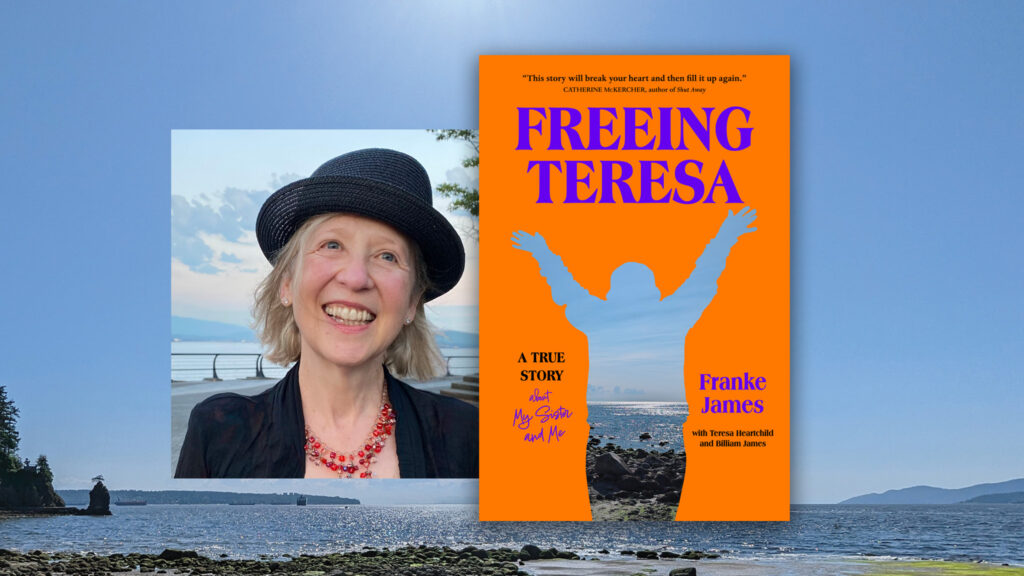
I was recently interviewed by Lisa McKinley for the Demand and Disrupt podcast which is produced by the Advocado Press and the Center For Accessible Living in Kentucky. Disability activist Mary Johnson’s exceptional book, Make Them Go Away, is what first connected me to Advocado Press and all the great things they are doing. When I first heard the title of the podcast, it struck me as so appropriate for a disability show! Demanding and disrupting is exactly what is needed for a fairer society accessible to everyone. So, I had a great chat with Lisa, which is excerpted below. I hope you enjoy our conversation and it inspires you to listen to more episodes and also read Freeing Teresa!
Episode 26: I Am Alive
On this episode of Demand And Disrupt, Lisa McKinley speaks with Canadian author Franke James about her latest book, Freeing Teresa, a true story of heartbreak and triumph. (Listen to the full podcast here.)
Lisa McKinley: Hello, welcome to Demand and Disrupt.
Franke James: Thank you Lisa for having me on. Freeing Teresa is a true story about my sister and me, and it’s taken 10 years to write. It’s about helping my sister Teresa get out of the nursing home that she was put into in 2013 and speak up for herself.
Growing up with Teresa
Lisa McKinley: Many of us don’t have the pleasure of knowing or loving someone with Down syndrome. Can you tell me what it was like growing up with Teresa?
Franke James: Well, when my mother—this was back in 1964 when Teresa was first born—was telling me about my new baby sister, she said that Teresa had some health challenges. She said that Teresa had a heart condition that might require surgery. And I was very, very upset. I was only a little kid at that point.
And then she said, “Teresa also has Down syndrome so that she won’t be like the rest of us.” I didn’t know what that meant, but my mother said that they would bring Teresa back home, and she would be part of the family. She would participate the same way as any of us and be showered with all the same love.
My mother believed in full inclusion
Franke James: My mother was a great champion for Teresa. Back in 1964, she had Teresa working with a personal trainer to help develop her muscles. By the time Teresa was four or five, she was able to climb the gym ropes. Just totally remarkable.
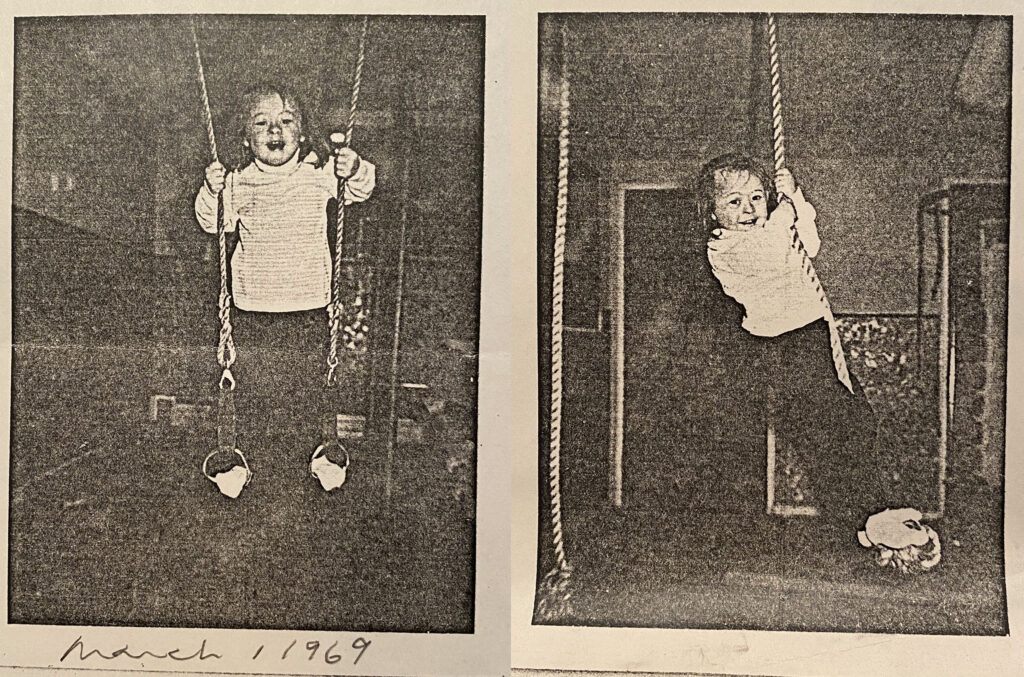
Also remarkably, Teresa went to the same school I went to. I was really inspired by Teresa and by my mother’s approach to helping Teresa to be included in all things. And I remember when she was just an infant, and I would stand outside the gym doors and Teresa would scream bloody murder. And I thought, “Oh mom, you’ve got to stop the lessons. It’s hurting Teresa.” And my mother would say to me, “No, no, no, it’s good for her.” She persevered. And Teresa was not in any pain at all. She was just learning how to do the exercises.
Lisa McKinley: I love that. God bless your mom because we need people like that.
Helping Teresa get out of the trap
Lisa McKinley: Teresa was put in a nursing home back in 2013, and you helped her get out. Can you tell me about that day?
Franke James: Yes. I was so shocked that Teresa had been put into the nursing home because I’d been trying to persuade my siblings that it was a bad idea and that we should find a way for Teresa to live in the community. She’d been successfully living with my dad for 49 years. But they decided that they would take Teresa out for breakfast. And then they put her into the nursing home without telling Teresa or my dad what was happening. And I was so upset when I heard. So I talked to my dad, and I said, do you want to get Teresa out of there? And he said, “Yes, it’s a terrible thing that she’s there.”
Four days after she was put in, we helped my dad go to the nursing home. We asked to see Teresa, and saw that she was in a shared room. We sat there for hours asking if we could see the admission papers that had gotten Teresa put in. And the nurses came in and out, perhaps wondering what’s going on? Why are these people here asking for the admission papers? But eventually we got them. My dad, who was a retired lawyer, was able to see that he was still senior power of attorney on the forms and that gave him the power to sign Teresa out. And so I checked with the disability lawyer that we had on call and he said, “Yes, you can sign Teresa out. Just tell them what you’re going to do.”
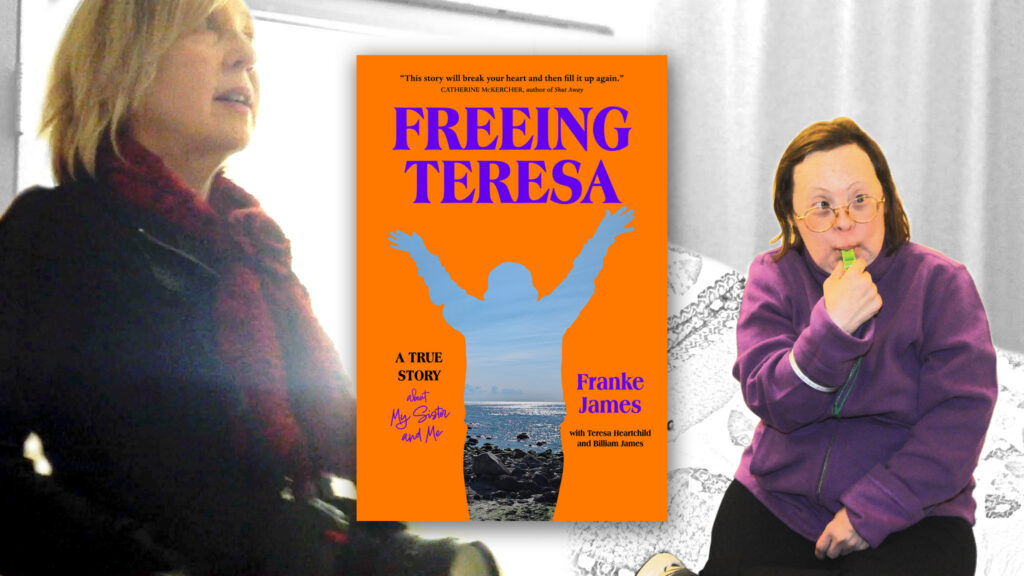
Discharged against medical advice
So we went to the front desk and talked to the CEO on the phone. And we talked to the nurse in charge. They said that we could take Teresa out but she would be discharged against medical advice—because they still believed that Teresa had to stay in the nursing home. God bless my dad, he just signed the forms and said, we’re taking her out. We were so thrilled. But just as we were leaving, we heard that my sister, who I called Deirdre in the book, was coming down and wanted us to wait until she got there, however we weren’t waiting. We hopped in a cab and we went back to my father’s condo to celebrate that we had gotten Teresa out. We were so happy.
Stopping the train driving Teresa into long-term care
Lisa McKinley: Now, before Teresa was placed in the nursing home by your siblings, you actually told them, “I would like to take Teresa home with me to live with us,” but they went ahead and had Teresa placed in the nursing home. Why do you think they did that?
Franke James: When Bill and I came up with the idea that we would take Teresa into our home, it was to stop the freight train that was driving Teresa into the nursing home. We thought this would do it. We weren’t going to take Teresa before, but we agreed to take her to stop the train that was putting her into long-term care. So we offered to take Teresa.
Unfortunately, my siblings just went ahead. I think I was seen as the little sister who was upsetting their plan. And when I go back to what they said about their reasons, they gave a lot of reasons why Teresa had to be in long-term care. But none of them made any sense to me. Things like, she needs 24/7 care. Well, she didn’t. We don’t have enough money. Well, that’s not a reason to put her in long-term care and they just go on and on.
A difficult but important story to tell
Lisa McKinley: In the book, you have a lot of the figures represented as white silhouettes. Can you tell us about that and why you chose to represent certain characters that way?
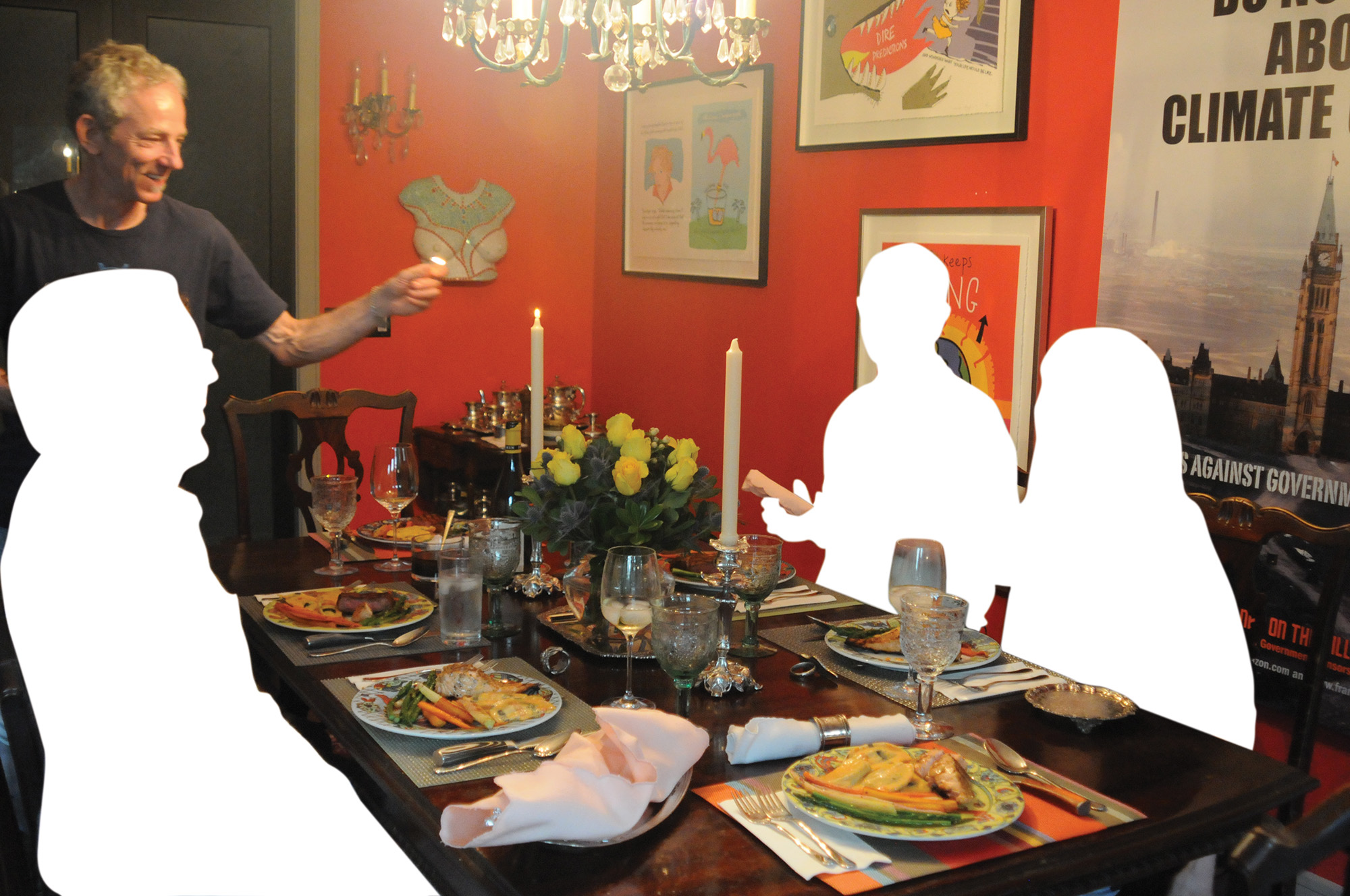
Franke James: So this is a very difficult story to tell and I’ve had to consult lawyers about privacy issues. The reason that I’ve made my siblings as white silhouettes is to protect their privacy. I can have photos in the book which document what happened and the nice life that we were having. I can be in the photos, but the figures of my siblings are not in the photos; they’re silhouettes.
And they really represent a loss in my life and in Teresa’s life, too. Unfortunately, we are no longer in touch with my siblings. We could be in touch with them, but they would have to recognize that Teresa never had to be in a nursing home, and they haven’t recognized that.
Truth on the table
Lisa McKinley: Do you think it’s possible to reconcile with your family at some point?
Franke James: Well, I think we need truth and reconciliation. Anything is possible. But we need to have the truth on the table in order to have reconciliation. I’m happy that I believed in Teresa all along and she’s really flourished.
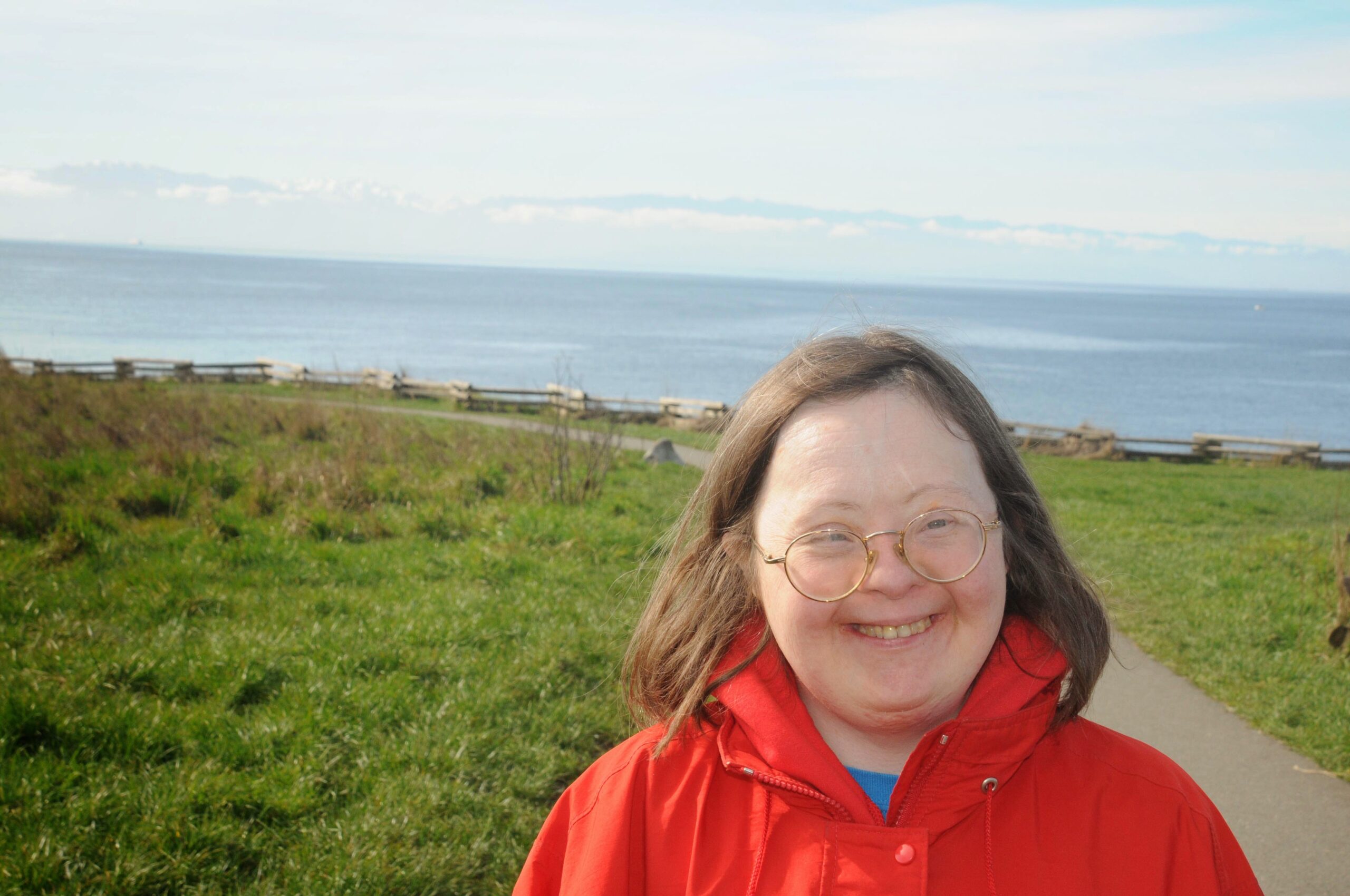
And when I go back to that time, it was just a belief. It was a belief. I looked at Teresa and I saw a beauty in her and I saw energy and love and I didn’t understand what was happening to her, but I was sure that I could provide a wonderful life for Teresa. And thank God it’s happened that way. And she’s gone on to become a published author and to actually get an apology from the government for putting her into long-term care.
Teresa has been celebrated as a champion for change by the human rights commissioner here in BC. Many people are happy to see that Teresa has spoken up for herself, said that what happened to her was wrong, and pleased that she’s going to have a nice life.
How has Teresa enriched your life?
Lisa McKinley: I think it’s incredible that you all have found this wonderful life with each other. How has Teresa enriched your life? Because I know initially it wasn’t your plan for Teresa to come live with you. Initially, your brother was going to open his home to Teresa, but he decided against that and now Teresa lives with you, and I’m sure that has enriched your life in ways you never even thought possible. Could you tell us about that?
Franke James: Yes, it has turned our life upside down, but in many ways it’s improved it. So we were quite happy living in Toronto. We had a nice house, we had a nice business, we had nice friends, but when the shit hit the fan, we dropped everything and we decided to move west. Thousands of kilometers away from Toronto to the West Coast of Canada, Vancouver.
Really, our lives revolve around Teresa. It is so inspiring that Teresa’s found her voice, she’s speaking up, she’s making art work, she’s letting us know what she thinks and feels. We see it every day.
Growing into becoming a caregiver
Lisa McKinley: I wonder if you would speak to some of our listeners who may be in that same situation. Maybe they have a loved one that needs more care than what they’re getting and there’s the choice to open the home to that loved one. What would you say to family members?
Franke James: Well, I had to grow in order to become a caregiver to Teresa. And I wasn’t really sure if I could do it. Now I brush Teresa’s hair, I put mineral oil in her ears at night time. I read stories to her and we draw on the computer. And these are all lovely things that I’ve grown into doing. But they’re not things that I initially understood that I would have to do.
So, I would say that helping someone vulnerable live in the community will enrich you a thousandfold. It may be very difficult to believe that that is true, but in my case with Teresa, it has been true. We’ve all blossomed and grown.
What’s ahead in the future?
Lisa McKinley: I know you have some really cool things coming up regarding your advocacy and things going on with you and Teresa. Can you tell me what is in the future for you all?
Franke James: Well, there are two things that I’m really excited about. One is we’ve got an audiobook coming out, and that is going to be so fun. It’s the Freeing Teresa audiobook. We have a full cast with over a dozen actors, two with intellectual disabilities. The actor playing Teresa is Lauren Potter, who is an American TV star better known for Glee. And we’re very excited. I think that this book is really going to be powerful to listen to because you’ll be able to hear all these different voices of the characters in the book instead of just me reading the whole thing.
Lisa McKinley: And I know you have some events planned. Can you tell us about that?
Franke James: Yes! Teresa and I are appearing at a panel at the Inclusion BC Conference in late May. The panel is “The Quiet Reinsinstitutionalization of Young People with Disabilities in Nursing Homes.” We have a couple of experts on the panel with myself and with Teresa, and we’re going to be talking about the problem. And I think that Teresa has such an important role to play because she is a living example of someone that this happened to 10 years ago, and it should never have happened.
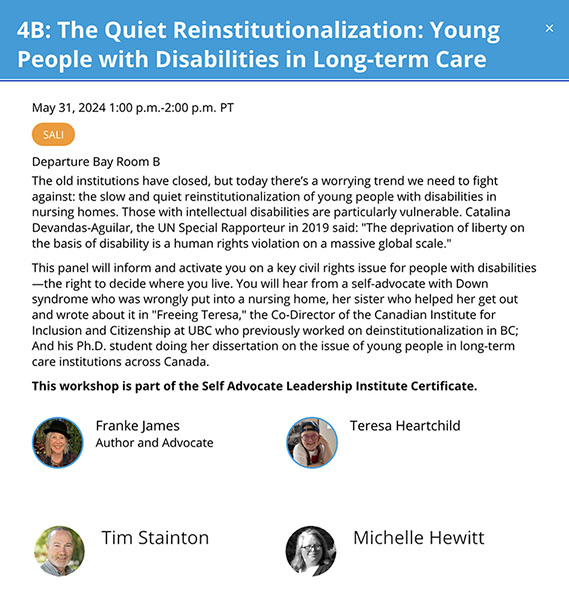
Teresa’s self-talk poem: “I Am Alive”
Lisa McKinley: Franke’s right. It should have never happened. But the sad truth is stories like this will continue to happen without the support of strong advocates. So thank you Franke. We’d like to end today’s program by taking a few minutes to listen to a short poem. Teresa wrote about what it means to her to be free and alive. It is a poem of self-talk. Self-talk helps Teresa make sense of the world around her. And now here’s Teresa.
Teresa Heartchild: I AM ALIVE.
Hello.
Be nice to everyone.
Look, I am alive.
You have to be nice.
I am doing fine.
Thank goodness.
I have to be nice to them.
And to the others.
That’s a brilliant idea!
You’re thinking.
And I’m thinking too.
I think we need to make a list of the things we need.
Right. I’m alive. Nesters. Flying Pig. Prado.
We love it here.
Everybody loves me.
You guys are alright, I know.
You guys, I am born. I am alive.
Redeemed.
Okay, I am reborn.
In Gastown.
The Demand and Disrupt podcast is supported by the Advocado Press and the Center For Accessible Living based in Louisville, Kentucky. This excerpt of the interview has been condensed and edited for clarity.
“Our interview with Franke James about her book “Freeing Teresa” has been one of our most popular podcast episodes to date. The link to the episode has been shared more than any other.” Dave Matheis, Center For Accessible Living
